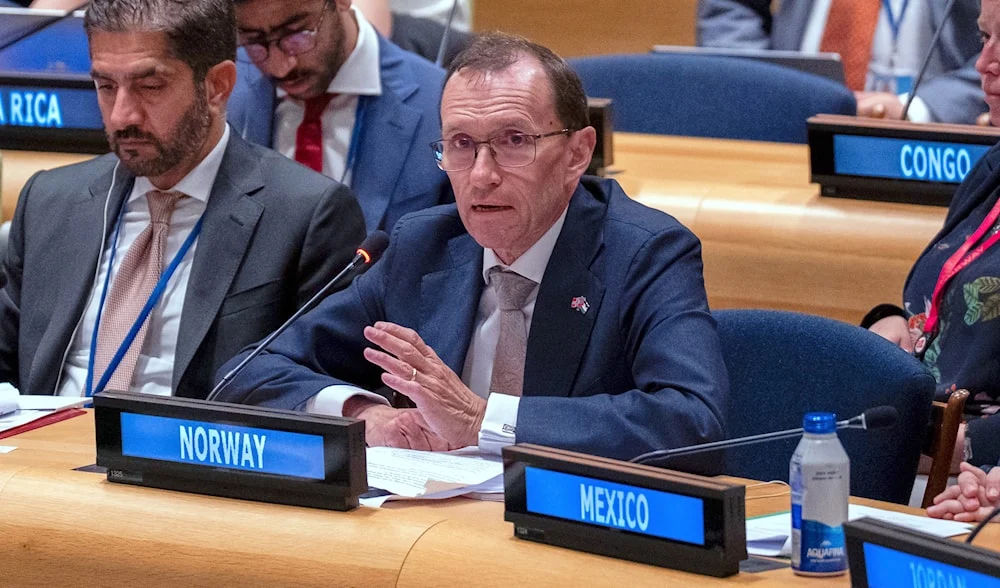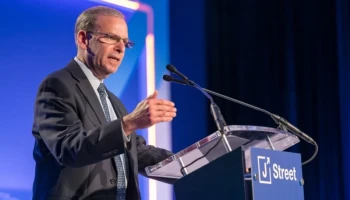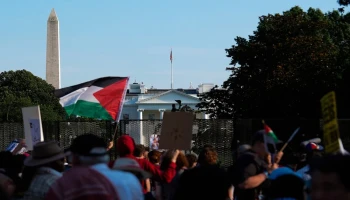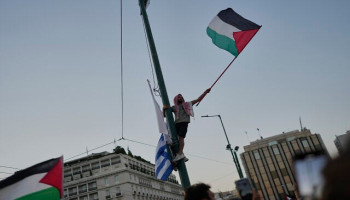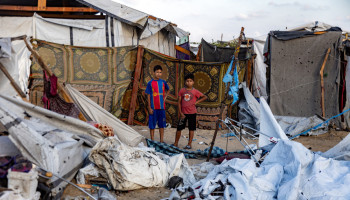Norway has initiated a comprehensive review of its $2 trillion sovereign wealth fund's investments in 65 companies based in "Israel," following growing concerns over links to the Israeli war on Gaza. Jens Stoltenberg, Norway's finance minister, directed the country’s central bank and the fund's ethics council to examine these holdings, citing the deteriorating situation in Gaza and the occupied West Bank.
The sovereign wealth fund, managed by the Norwegian Central Bank (the Norges Bank), is under scrutiny from multiple political parties, trade unions, and civil society groups. Critics argue that the fund is complicit in supporting companies that contribute to "Israel's" ongoing genocide in Gaza and occupation of Palestinian territories.
The renewed criticism intensified after Aftenposten, a Norwegian newspaper, reported that the fund had increased its stake in Bet Shemesh Engines, a company allegedly involved in maintaining aircraft used in "Israel's" bombing campaign on Gaza. At the end of 2024, the fund's $15 million stake gave it a 2.1% share in the company, over four times its value at the end of 2023. Overall, the oil fund invests only 0.1% of its $2 trillion fund in Israeli assets as of 2024.
Prime Minister Jonas Gahr Støre expressed his concern over the revelations and urged Stoltenberg to seek clarity from Norges Bank. Stoltenberg noted, “The war in Gaza is contrary to international law and is causing terrible suffering, so it is understandable that questions are being raised about the fund’s investments in Bet Shemesh Engines.”
Spotlight on Bet Shemesh Engines investment
Bet Shemesh Engines has emerged as a focal point in the growing controversy surrounding ethical investment standards. The fund's stake in the company, criticized for its alleged role in supporting "Israel's" military operations, has intensified national debate, particularly as Norway approaches a closely contested parliamentary election on September 8.
Nicolai Tangen, CEO of the oil fund, clarified that the investment in Bet Shemesh was made through an external manager and that the company was not on any exclusion list maintained by the ethics council, the UN, or other bodies. "We will go through the new information," he stated.
Since 2004, the fund has operated under ethical guidelines enforced by an independent Council on Ethics. Companies are excluded if there is an unacceptable risk of contributing to violations such as grave human rights abuses, environmental damage, or breaches of international law.
The ethics council has recommended excluding nine companies based in "Israel" since 2009, two of which were added in 2024 due to links with West Bank settlements and the Gaza war. Some officials within the fund have voiced frustration over the slow pace of recommendations. However, there is also apprehension about the potential diplomatic fallout, particularly with the US, should the fund withdraw from too many Israeli firms.
What Is Norway's oil fund?
Norway’s sovereign wealth fund, officially known as the Government Pension Fund Global, was established in 1990 to manage the country’s oil and gas revenues. Rather than investing domestically, every krone from petroleum income is placed in foreign investments to prevent economic overheating and ensure long-term financial stability.
As of mid-2025, the fund holds assets worth nearly $2 trillion, making it the world’s largest sovereign fund. It owns about 1.5% of all listed equities globally, investing in more than 9,000 companies across 70 countries. Its portfolio is diversified, with around 70% in equities (including stakes in Apple, Samsung, and Nestlé), 27% in fixed income (such as US Treasuries), and the remainder in real estate and renewable energy.
Norway opposes Israeli war crimes
Norway has taken a bold diplomatic stance on Palestine. On May 28, 2024, it formally recognized the State of Palestine, calling it a necessary step toward peace. Oslo continues to support a negotiated "Two-State Solution" and chairs the international donor group for the Palestinian Authority.
The government has also condemned settlement expansion and warned that practices such as forced transfer and obstruction of humanitarian aid violate international law. In 2025, Norway submitted statements to the International Court of Justice, highlighting "Israel's" obligations to end the occupation and allow humanitarian access.
Arms exports to "Israel" are already banned, and targeted sanctions have been imposed on certain extremist Israeli officials. Together with rising civic engagement, these policies mark a firm shift toward solidarity with Palestine.
Norwegian civil society
Norwegian civil society groups, trade unions, and activists have called for stronger action against "Israel." The LO, Norway’s largest trade union representing a million workers, voted overwhelmingly in May 2025 for a full economic boycott of "Israel" and urged divestment from all companies aiding the occupation.
Mass rallies, campus protests, and consumer boycotts have surged across the country, especially since the start of the Gaza war. Norwegian People’s Aid and other NGOs have campaigned actively for ethical accountability in the fund’s investment practices.
Source:Websites

